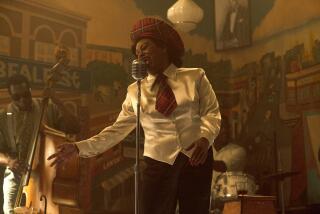HOT FACES: JAMI GERTZ AND MARIO VAN PEEBLES
- Share via
Last Christmas 27-year-old Mario Van Peebles got an unusual gift: an identity. “I went from being ‘Mario who?’ to ‘Mario baby!’
“Suddenly, Hollywood saw me as no longer black, merely the son of a famous film director (Melvin ‘Watermelon Man’ Van Peebles) or an unemployed actor often mistaken for a parking lot attendant. I had become Clint Eastwood’s buddy who saved America from the evils of Grenada,” jokes Van Peebles of his supporting role in “Heartbreak Ridge.”
Van Peebles, who currently stars in “Jaws: The Revenge,” brings a rare energy to an interview, as if he’s auditioning for a role. Ask him a question and his answer can become a performance. He moves, jokes, gestures or struts to his responses.
Eastwood realized the value of Van Peebles’ personality at their initial meeting. “Mario came into my office and took over (the audition),” Eastwood said in a telephone interview. “I realized immediately he had the energy, ability and ambition to become successful. The pleasant surprise was Mario gives you everything on the set. He’s void of ego and filled with good ideas.”
Eastwood persuaded his own agent--William Morris’ Leonard Hirshan--to represent Van Peebles.
But the first thing the Berkeley-raised Van Peebles did was turn down “Jaws 4”--the first major role that he was offered after “Heartbreak.” He later changed his mind.
“All I could visualize was my head floating around in 3-D. Then I read the script to ‘Jaws: The Revenge’ and was pleasantly surprised. It was sort of ‘Ordinary People Meets the Shark,’ ” says Van Peebles between bites of a non-performing shark for lunch.
“Joe Sargent (the director) gave me the freedom to wear glasses and look slovenly, almost as if I was a brown version of the Richard Dreyfuss character in ‘Jaws.’ I saw this film as a chance for me to do a character different than my offbeat Marine in ‘Heartbreak’ or the lawyer I played (in early episodes) on ‘L.A. Law,’ which are probably the only things people will recognize me from.
“To be cast in this film as an oddball looking guy hopefully means Hollywood might see me as a character actor instead of a black leading man--which is the definition of unemployment here--unless you’re Eddie Murphy.”
Born to a German artist and a black film maker, Van Peebles spent his pre-teen years working as a “go-fer” on his father’s pictures. At 20, he debuted on Broadway opposite his father in “Waltz of the Stork.”
“My father told me you have two loves in your life: What you do and the people you’re with,” he says.
Next he earned an economics degree from Columbia University and went to work as a budget analyst for New York Mayor Ed Koch. Acting lessons with Stella Adler and modeling jobs through the Ford Agency followed and convinced Van Peebles to return to the arts.
“When I came out to Hollywood, I discovered the perfect place for my creative madness--Cannon Pictures,” explains the actor as he mimics the company’s chief executives: “You want to write songs and you won’t charge us. Fine. Make your own costume, edit your own movie. Go and edit someone else’s movie here. We don’t care as long as you don’t charge us.”
Van Peebles got the lead in the Cannon break-dance film, “Rappin’ ” and wrote many of its songs.
“When the movie was being edited, the head honchos at Cannon discovered I owned the rights to all my songs and the dance sequences had been filmed to my music. Suddenly I got my first taste of ‘Mario baby!’ as in, ‘Hey pal we’re all friends. We’ll give you anything you want but money for your material,” says Van Peebles, his grin indicating he profited from his first lesson at playing producer. (He recently wrote, directed, acted in and edited his own short film.)
Van Peebles doesn’t think his color has held him back in movies. Though he’s been cast as “kid sidekick,” Van Peebles believes the only color Hollywood thinks about is the color of money.
“If I or any other black can deliver at the box office, I’ll get a lot of work. Too many young actors, regardless of their color, try to play an attitude on camera and fail to remember their job is to fit into an entertainment. You’ll never see a big star like Eastwood or Chuck Norris overact because they know people generally come to their films to see action. To paraphrase Dirty Harry, ‘an actor’s got to know his limitations.’ ”
More to Read
Only good movies
Get the Indie Focus newsletter, Mark Olsen's weekly guide to the world of cinema.
You may occasionally receive promotional content from the Los Angeles Times.










